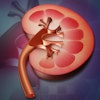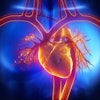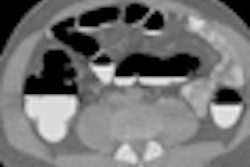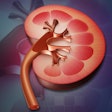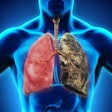ATLANTA - The presence of calcified aortic plaques -- often spotted as incidental findings on CT scans -- appear to be strong predictors of coronary artery disease and mortality, researchers reported at this week's American College of Cardiology (ACC) meeting.
The presence of high calcium scores can provide "a teachable moment" for clinicians to counsel their patients on lifestyle change or alert doctors to the need to undertake other treatments to prevent cardiovascular-related events, said doctors from Henry Ford Hospital in Detroit.
"This is a freebie," said Dr. Bryan Zweig, a fellow in cardiology at Henry Ford Hospital, at a poster presentation. He explained that abdominal CT scans were obtained as part of a normal workup for patients suspected of having coronary artery disease.
The researchers studied 367 patients who underwent an abdominal CT and cardiac catheterization within one year between January 2004 and May 2009. Patients had a 58% risk of having coronary artery disease if they had a corresponding abdominal aortic calcium score over 1,000, compared to patients who had an 11% risk with a score of 0.
A high abdominal aortic calcium score also was linked to a higher risk of mortality, said senior author Dr. Mouaz Al-Mallah, director of cardiac imaging research at Henry Ford.
Conversely, researchers found that a lack of abdominal aortic calcium was associated with a low risk of coronary artery disease, a chronic, progressive form of heart disease that results from a buildup of plaque in the arteries found on the surface of the heart.
"If you get a CT scan on your abdomen, there's probably a good chance that image can provide us with more information about the health of your heart arteries," Al-Mallah said. "This study clearly demonstrates that higher scores of abdominal aortic calcium are associated with higher rates of coronary artery disease and mortality."
Prior research has shown that coronary artery calcium found by CT is strongly associated with coronary artery disease and mortality. However, little is known about the risk associated between abdominal aortic calcium and coronary artery disease.
"If you have heart disease and abdominal aortic calcifications, your chance of dying is higher than just having heart disease alone," Al-Mallah said.
The study was funded by Henry Ford Hospital.
By Edward Susman
AuntMinnie.com contributing writer
March 15, 2009
Related Reading
A normal coronary artery calcium score is reliable for several years, March 12, 2010
Does coronary calcification accurately predict occlusion? Experts disagree, February 19, 2010
Zero calcium score enough to send chest pain patients home, February 10, 2010
Coronary calcification is a poor gauge of treatment efficacy, December 17, 2009
Copyright © 2010 AuntMinnie.com


